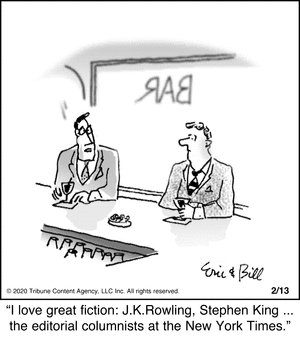Every so often, I can’t resist pointing out extreme examples of media bias.
- Washington Post
- New York Times
- Reuters
- Time
- ABC
- Associated Press
- New York Times (again)
- Washington Post (again)
- New York Times (again)
My goal is not to fixate on the bias, but rather to correct the underlying mistakes. And that’s the purpose of today’s column. Why? Because Maura Judkis of the Washington Post wrote a story about how capitalism supposedly is responsible for a drug store closing in D.C. Here are some excerpts.
There is almost nothing left to steal at the CVS in Columbia Heights… Everything else that remains in the store in Northwest D.C., which is not much, is under plexiglass… Other shelves, stretching entire aisles, are totally empty. …the Legend of the Empty CVS of Washington…became a horror story of Late Capitalism. …the zombie CVS kept filling prescriptions, dead but somehow still shuffling along — until Thursday, when corporate shut it down, at last. …there’s a Robin Hood mentality… Some shoplifters view it as a form of anti-capitalist social activism.
I read the entire report. As illustrated by the excerpt, it’s about a store being closed because of rampant crime. Which leads me to ask, what does this have to do with capitalism?!? The story doesn’t even try to explain how or why free markets are responsible. There wasn’t even a weak argument about businesses somehow having an obligation to lose money in order to serve a community.
If I had to guess, I’m assuming the reporter – and the editor who picked the headline – are so disconnected from reality that they implicitly assume that everything bad in life somehow is connected to capitalism.
Maybe they should set aside a couple of minutes to watch this video. Or this one or this one.
P.S. According to Wikipedia, the term “late capitalism” was first coined by German Marxists about 100 years ago and then spread to the English-speaking world in recent decades. If I understand the tortured reasoning, we’re now supposedly living in a Dystopian nightmare of corporate exploitation.
For what it’s worth, I have no doubt that corporations would like to exploit us, but the best way to avoid that is free enterprise – i.e., a system where companies can only make money by giving us better goods and services at attractive prices. That’s why I’m against industrial policy, protectionism, subsidies, bailouts, and other forms of cronyism that benefit companies rather than people. I’m guessing, however, that the people who use the term “late capitalism” won’t join me in the right to get rid of those statist policies.


No comments:
Post a Comment